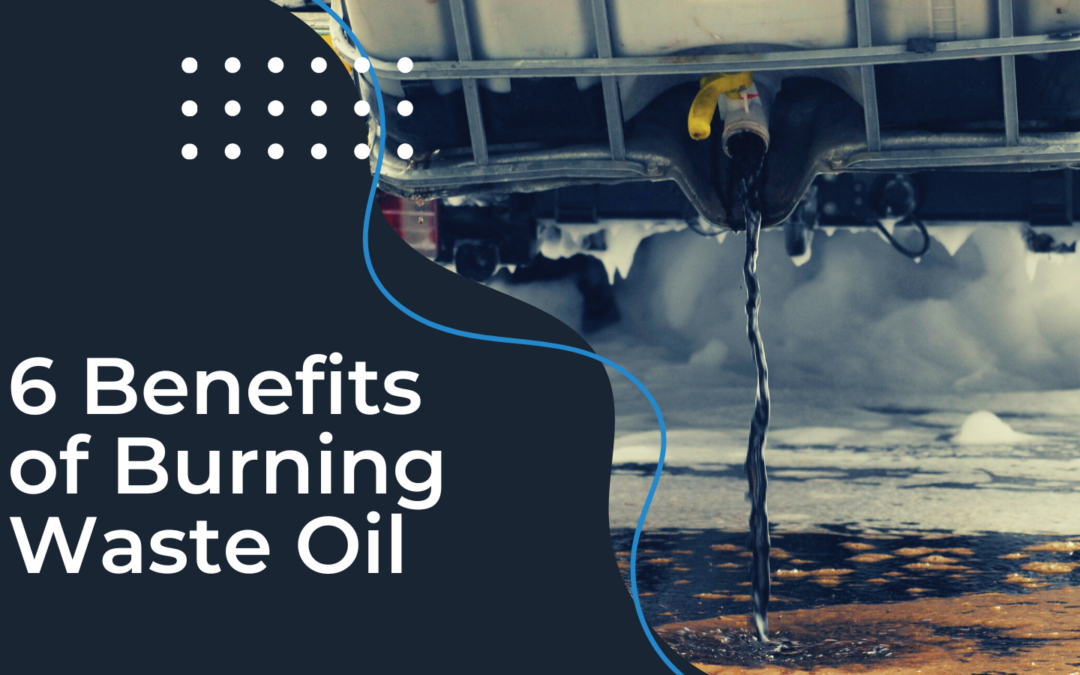Practically any kind of used oil can be repurposed as a fuel source. This includes motor oil, cooking and vegetable oil, hydraulic oil, and transmission fluid. You’ll warm up to the idea once you learn about the many benefits of turning waste oil into heat for your shop.

Reduces heating costs
Everybody’s feeling the economic pinch these days — and the situation is only going to worsen before it gets better. Oil and natural gas prices continue to rise; natural gas prices are expected to increase 28% and natural gas prices will go up 27%, according to the U.S. Energy Information Administration (EIA).
Burning waste oil is a great way to reduce your heating costs. It’s a free resource you’d otherwise have to dispose of offsite (at an additional cost). Depending on factors such as climate and shop size, the savings could be significant.

Protects the environment
Contrary to what you might think, burning waste oil is an environmentally friendly recycling solution. For starters, onsite storage reduces the risk of spills and contamination that might occur during transportation and disposal. And while the Environmental Protection Agency (EPA) has strict regulations for the disposal of used oil, each year an estimated 200 million gallons of used oil are disposed of improperly, contaminating soil and water supplies and potentially harming humans and livestock.
When you burn waste oil, you reduce the need for other fuel-energy sources such as oil, natural gas, propane, and electricity. This, in turn, cuts back on emissions from tanker trucks and power plants that would otherwise be used to transport and generate fuel. It’s a domino effect that leads to a smaller carbon footprint.

Conserves Energy
The National Oil Recyclers Association states that waste oil has almost twice the energy value of coal and generates more energy than #2 fuel oil. And one gallon of waste oil is equivalent to 18 kWh of electricity. Here’s another fun fact: it takes 42 gallons of crude oil to make 2.5 quarts of new oil, but only one gallon of used oil to make 2.5 quarts of like-new oil.
Prevents Water Pollution
Even though water covers two-thirds of the earth’s surface, it’s still a precious commodity in many parts of the world. People depend on fresh, clean water for drinking and irrigating crops. Unfortunately, enough waste oil seeps into U.S. soil and water every year to pollute the freshwater supply for three billion people. And that doesn’t count oil spills. When you burn waste oil, you prevent contamination of those precious water resources.

Eliminates Cradle-to-Grave Liability
Burning waste oil reduces your risk of running afoul of “cradle-to-grave” laws, which hold a business responsible for the safe management of solid and hazardous waste from the time it’s created until it’s disposed of. Even if that business outsources the task, it will still be held liable during transportation, treatment, and storage. And if that hazardous material is disposed of in a landfill (something that should only be done as a last resort) and contamination occurs, you can still be held financially responsible for cleanup costs.
U.S. EPA-approved Method of Recycling
When we think of recycling, we usually imagine sorting plastic, paper, and aluminum into special bins for repurposing. But because burning waste oil reduces the risk of spills and contamination and reduces the need for fuel oil and natural gas, the EPA considers waste oil combustion as a preferred method of recycling used motor oils.

